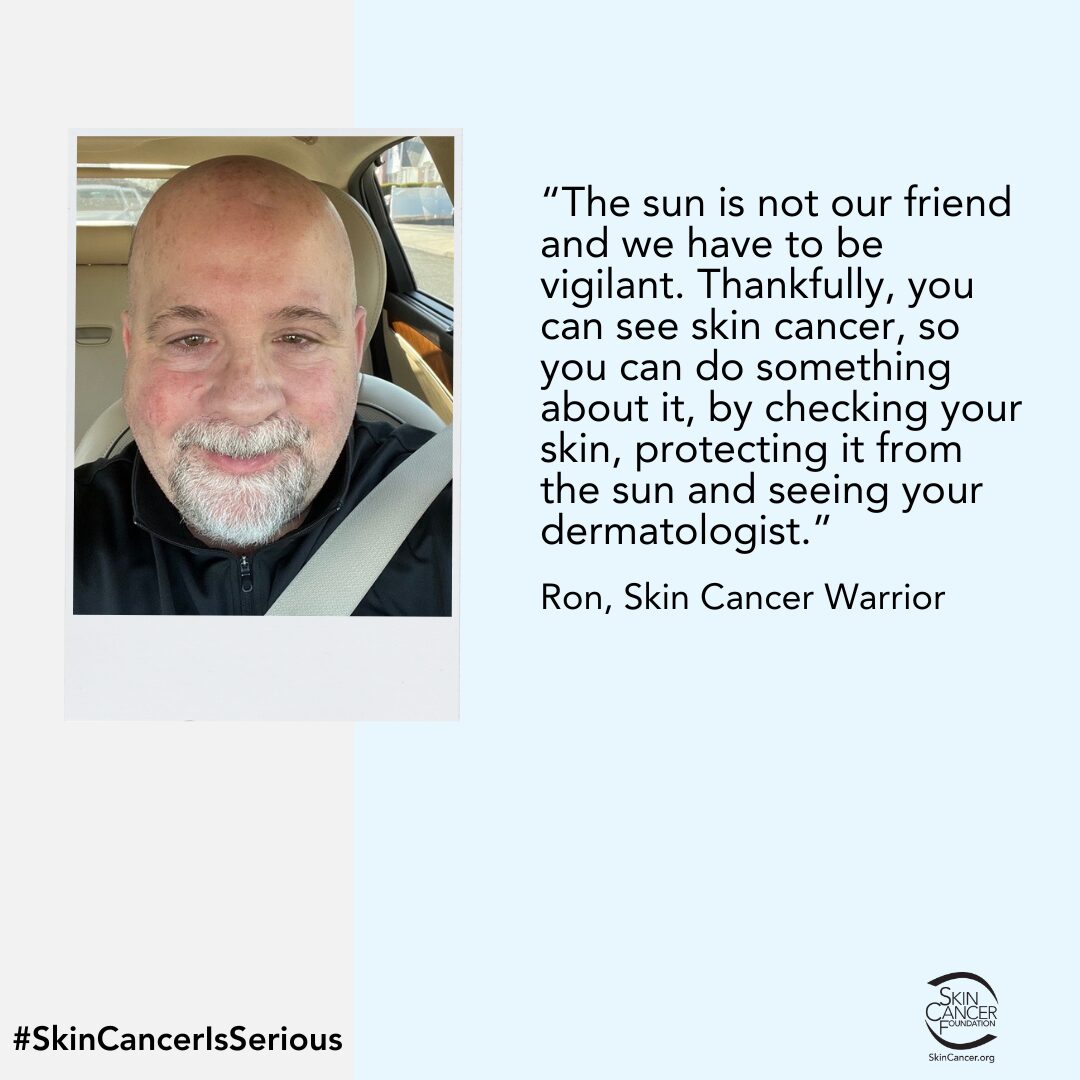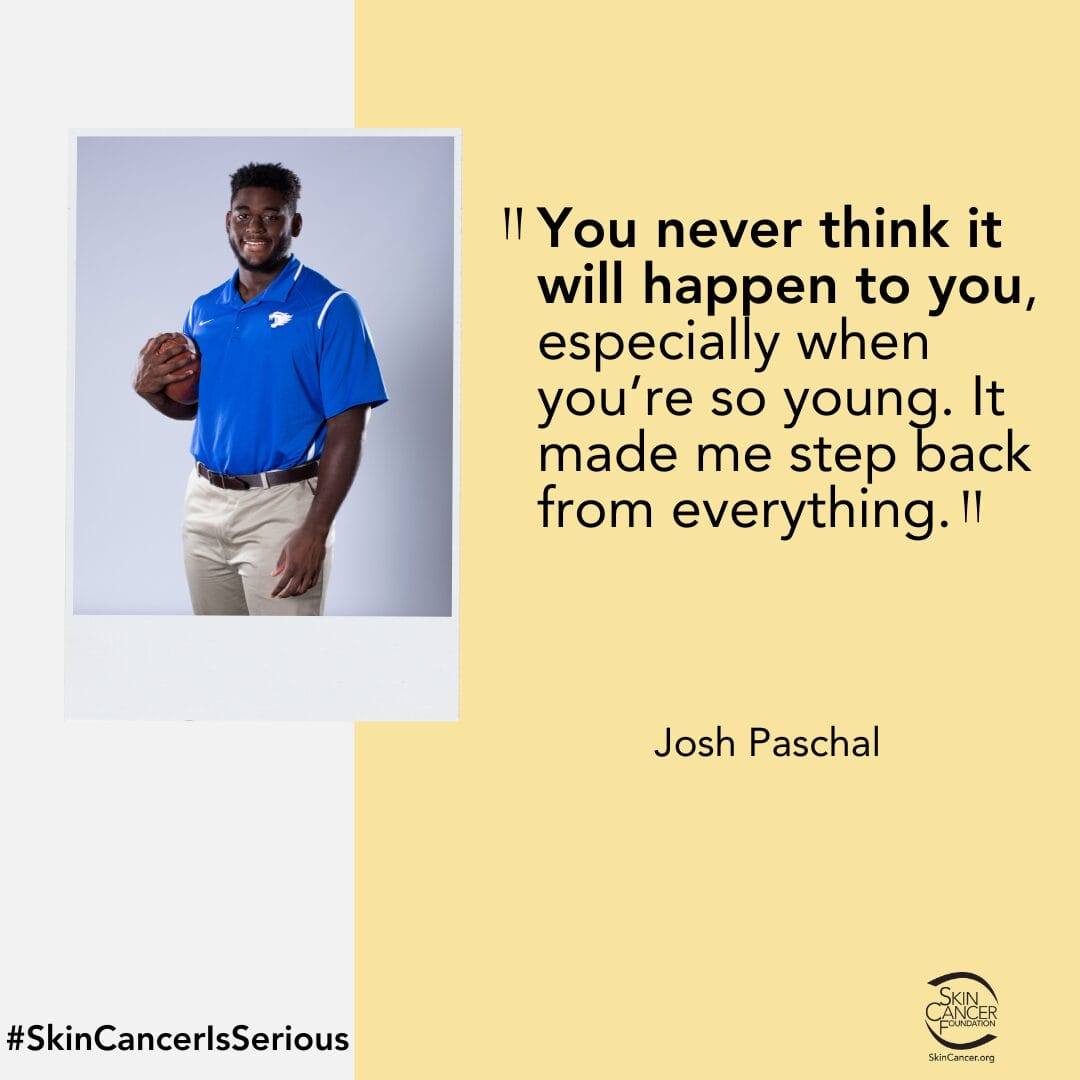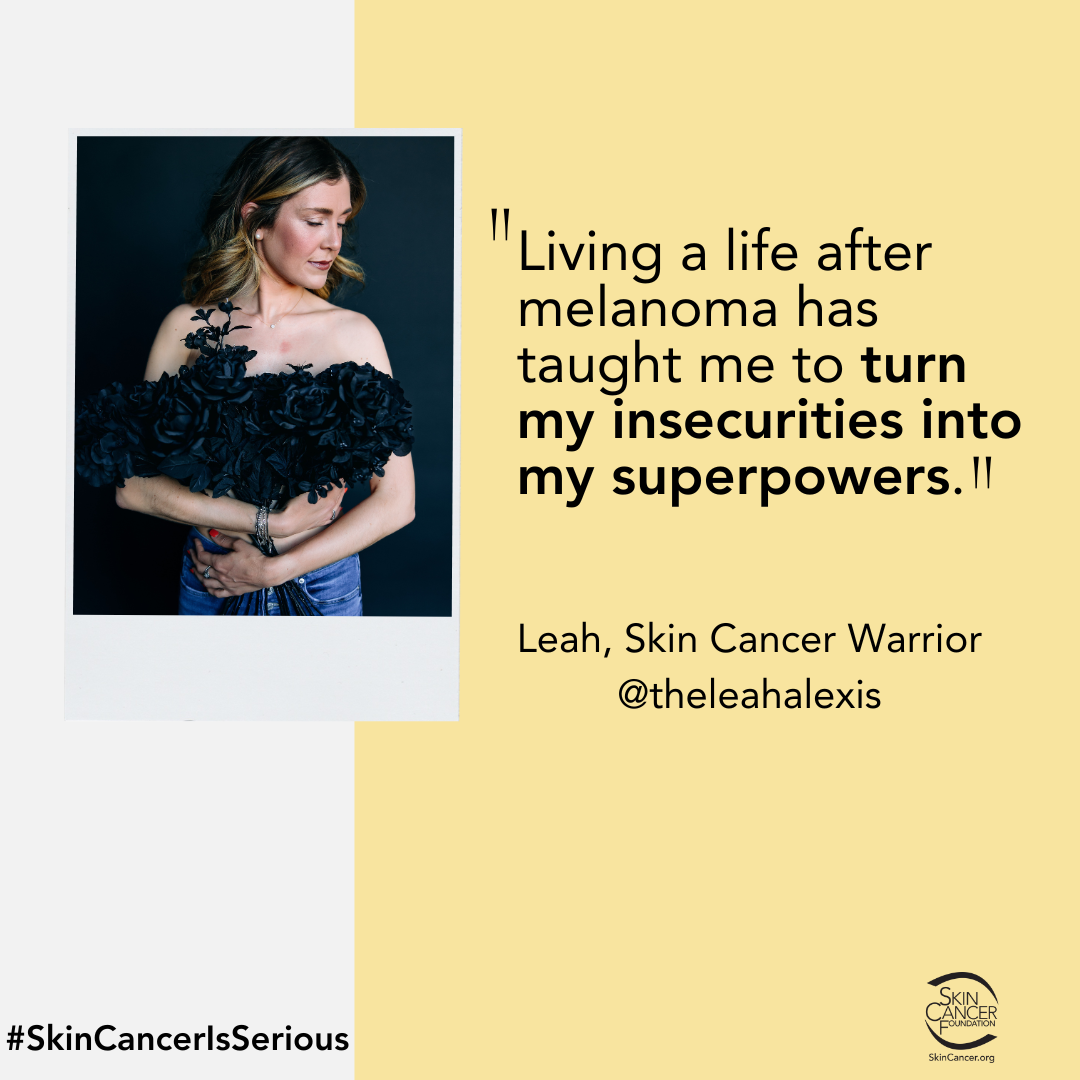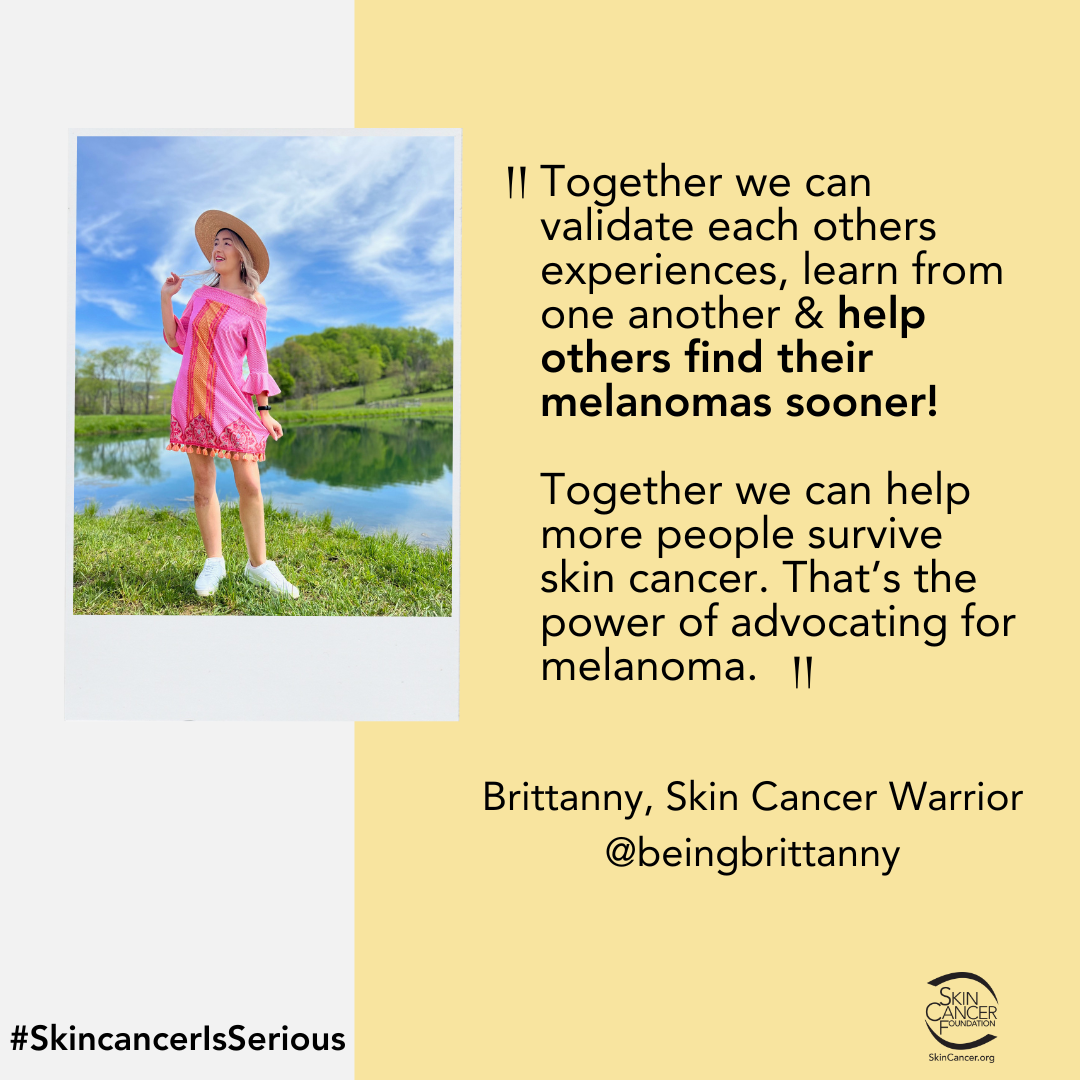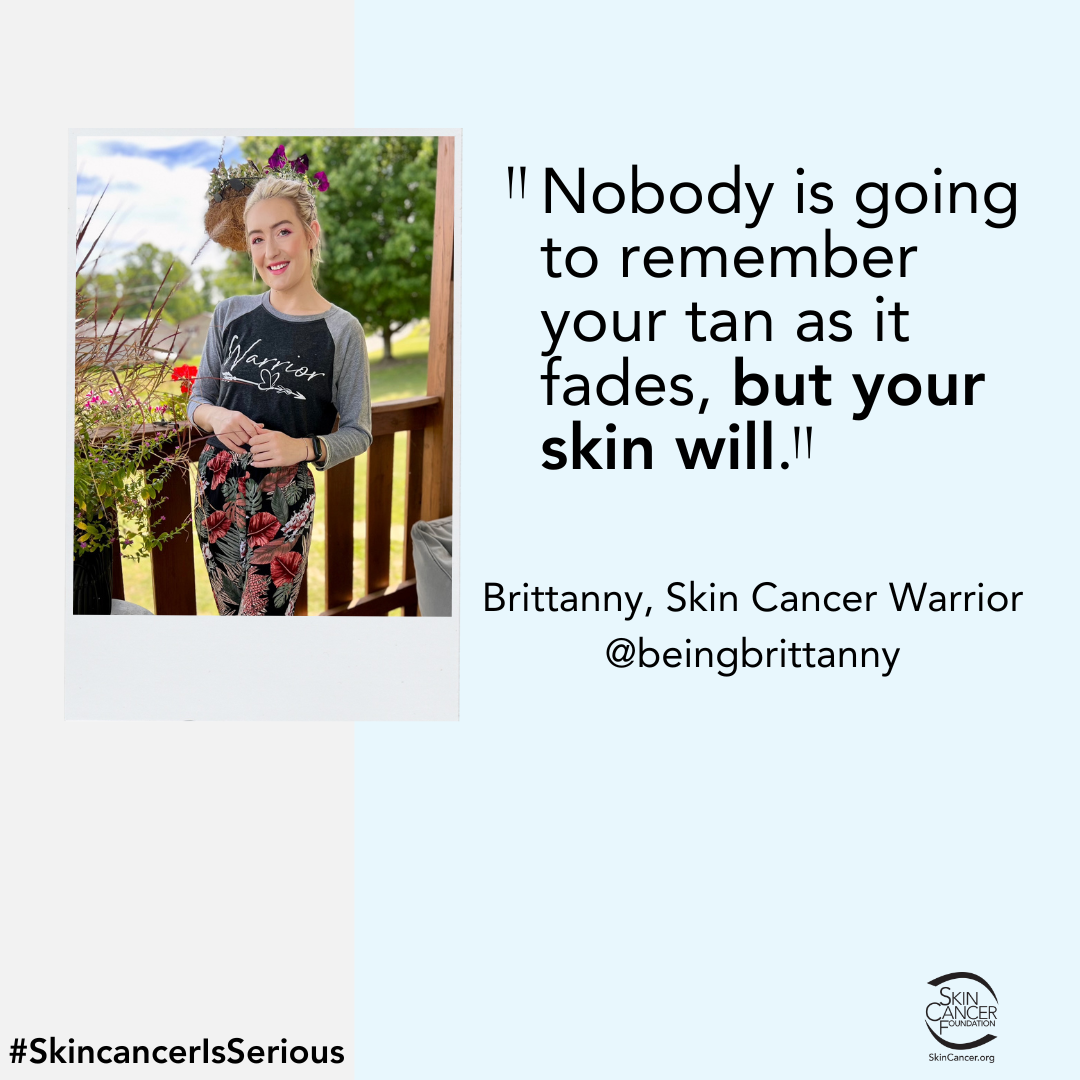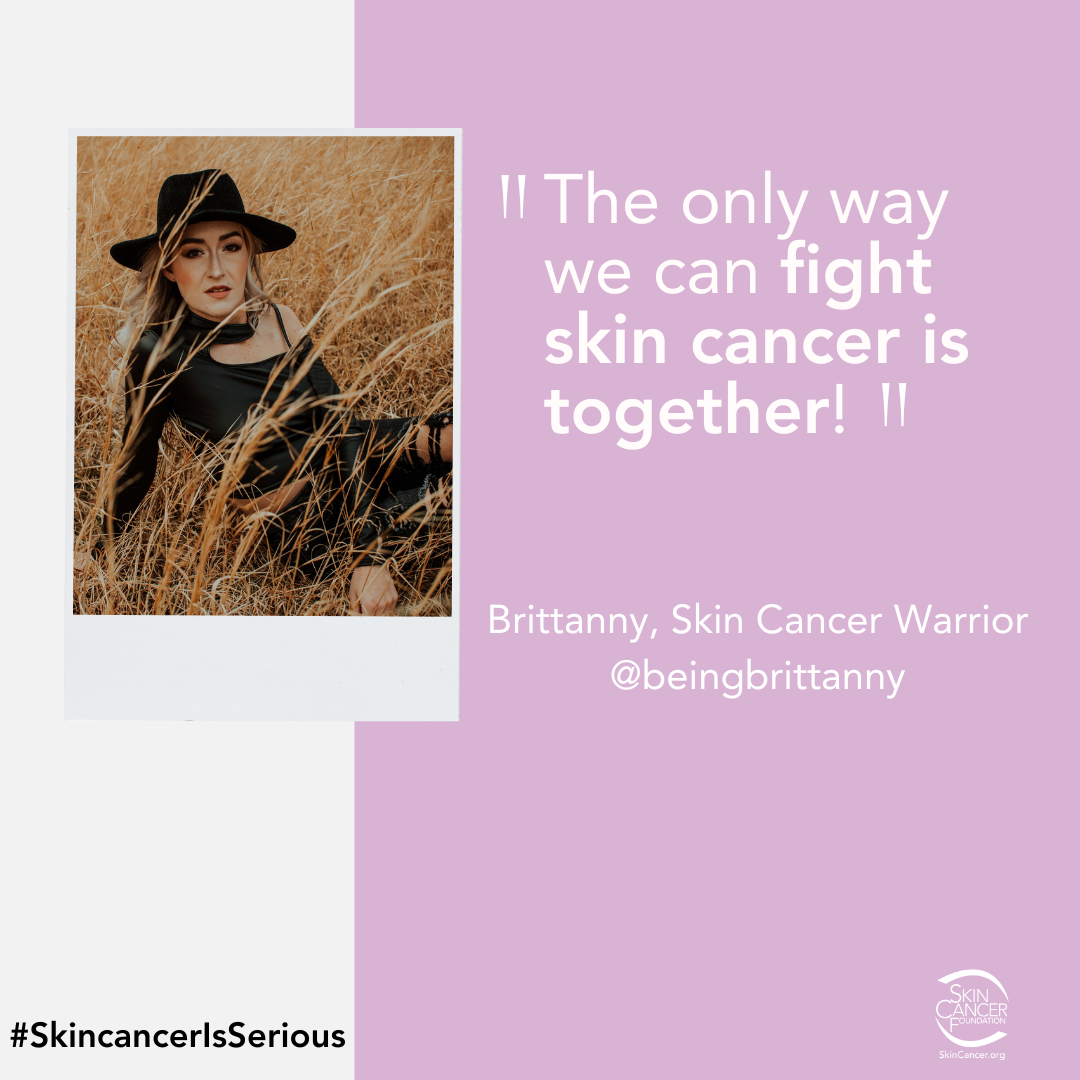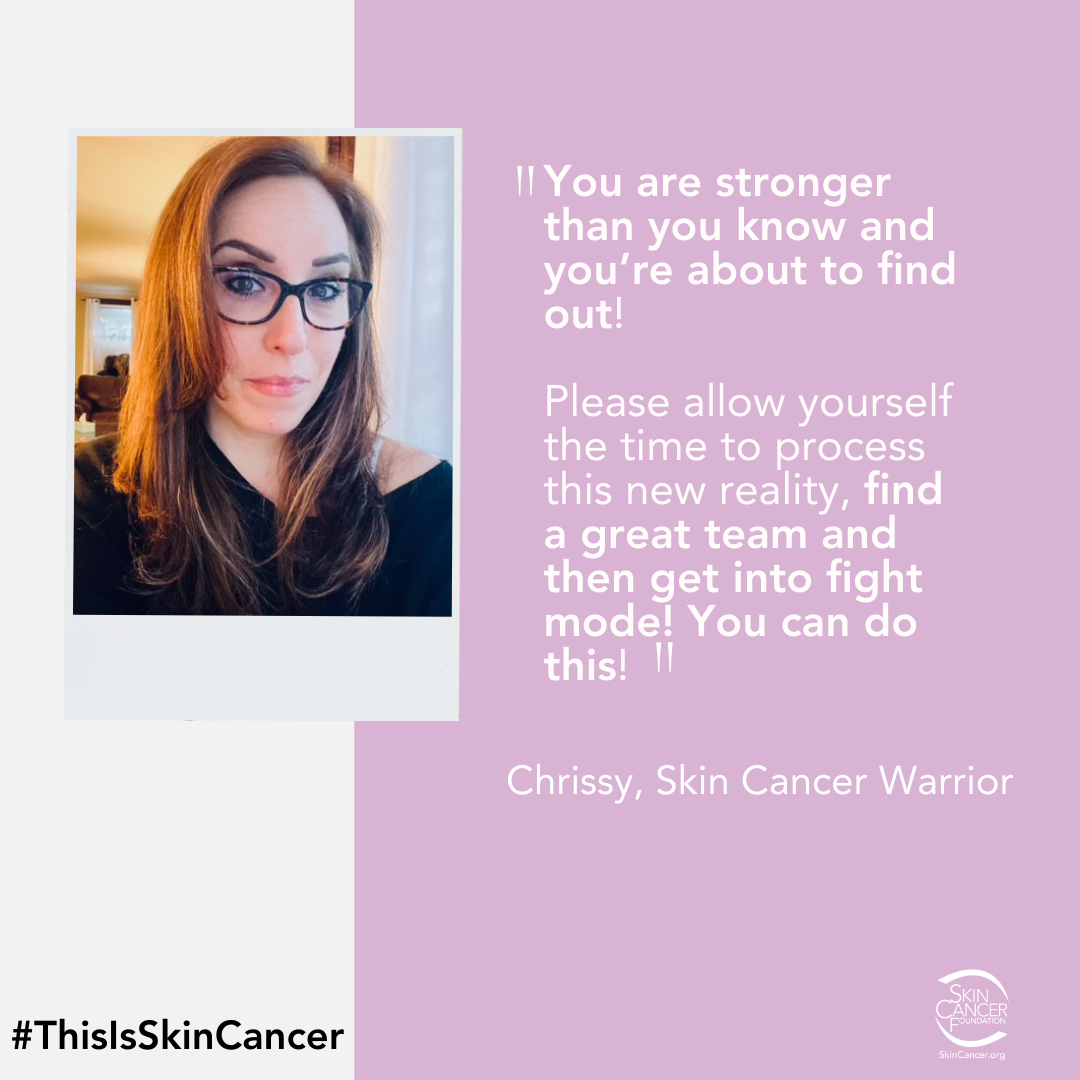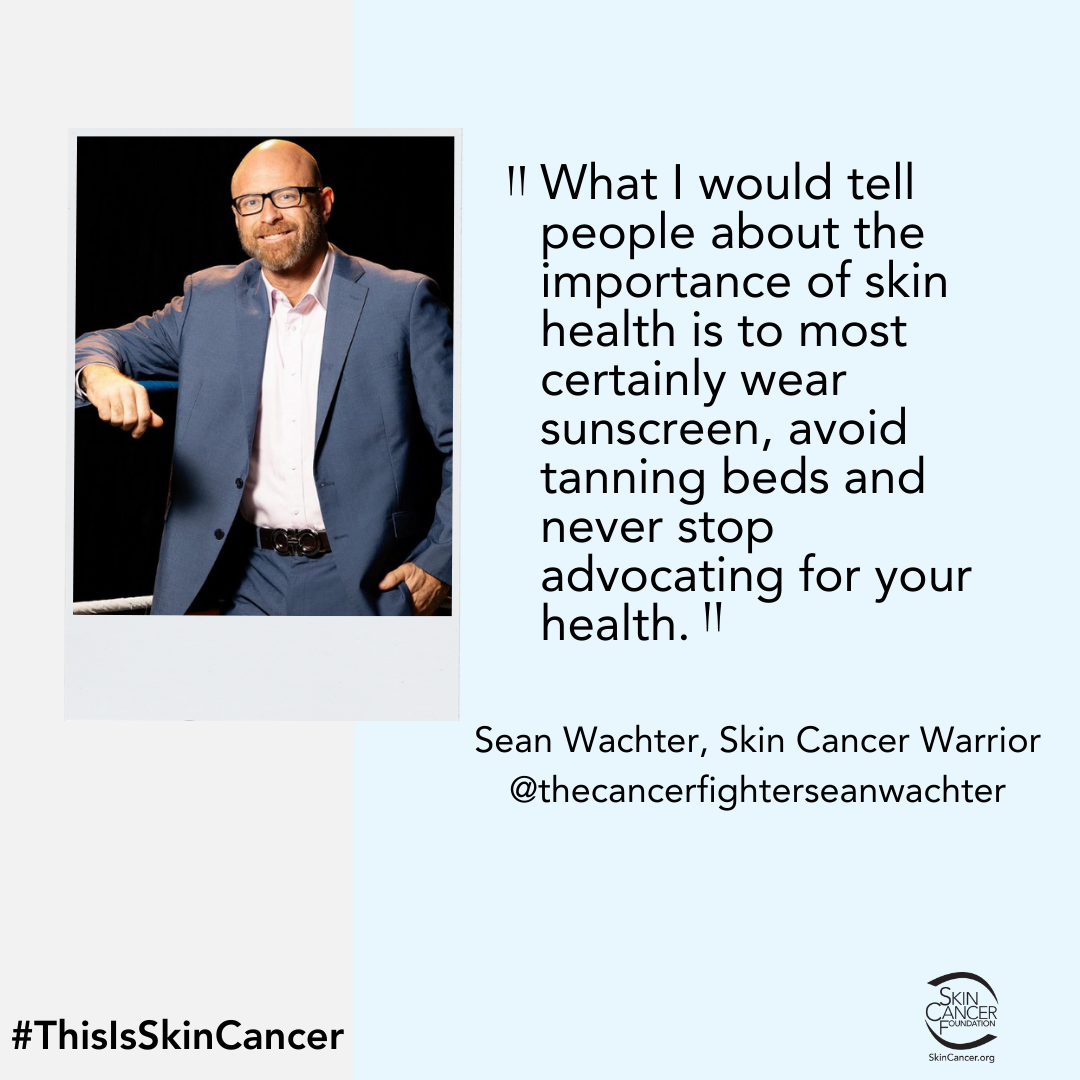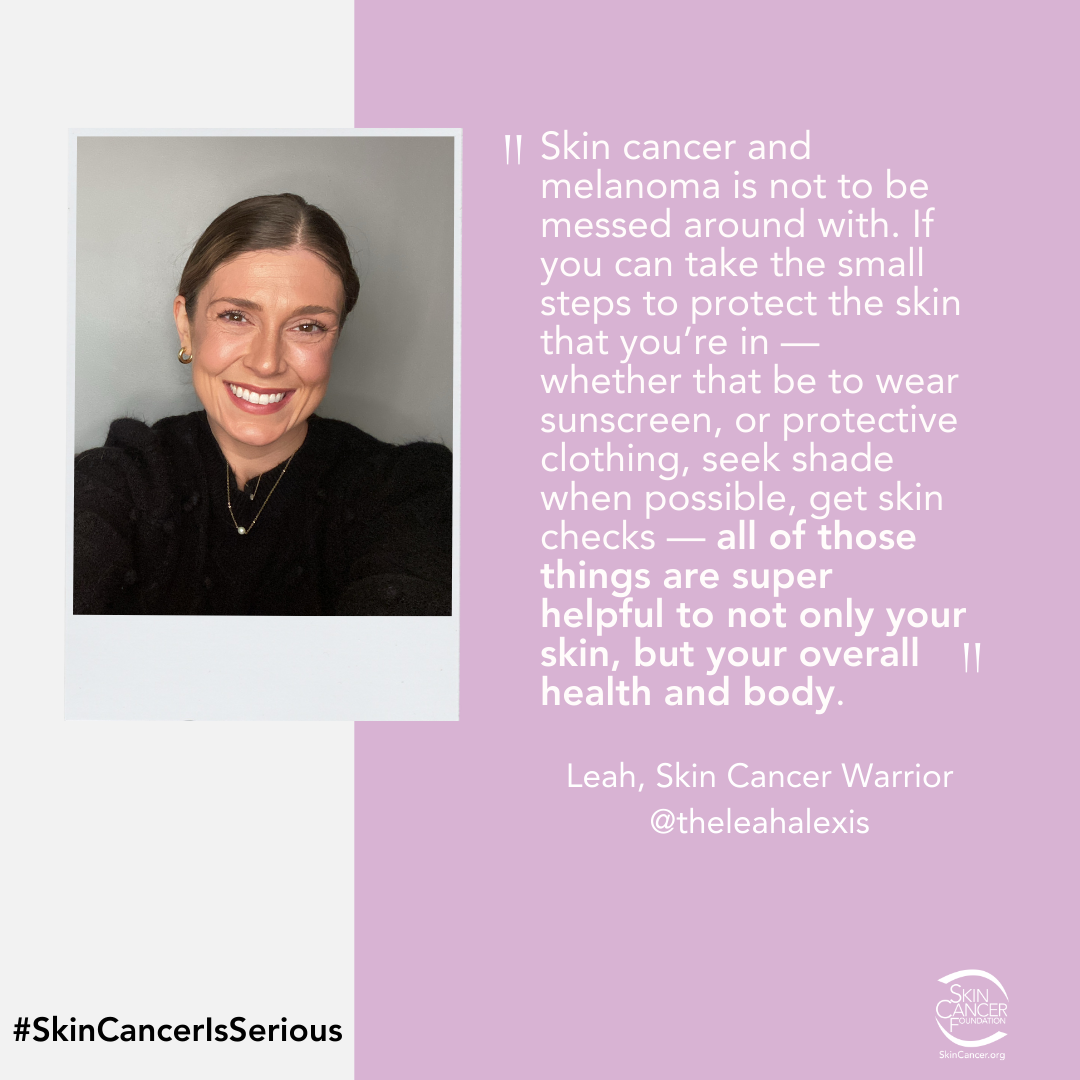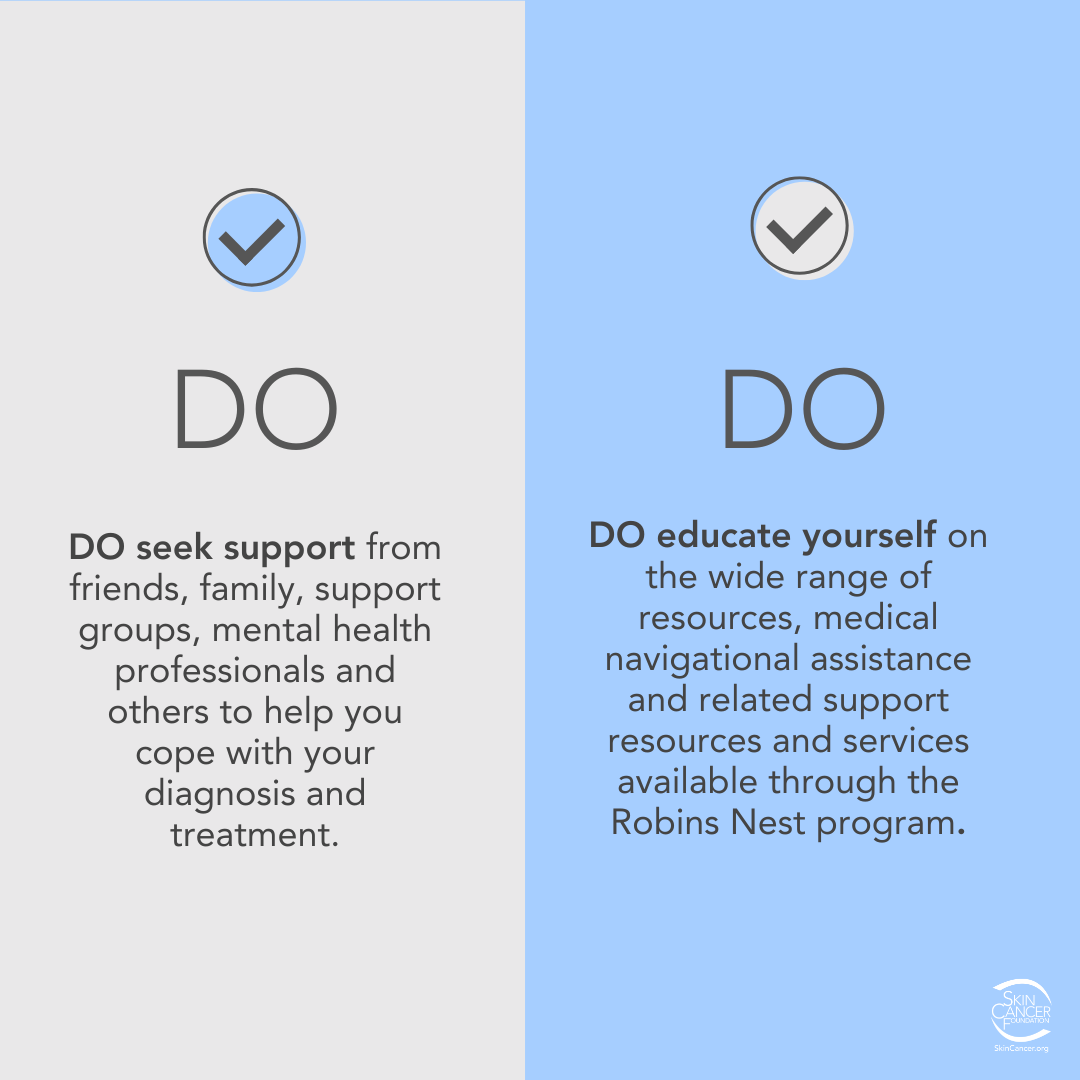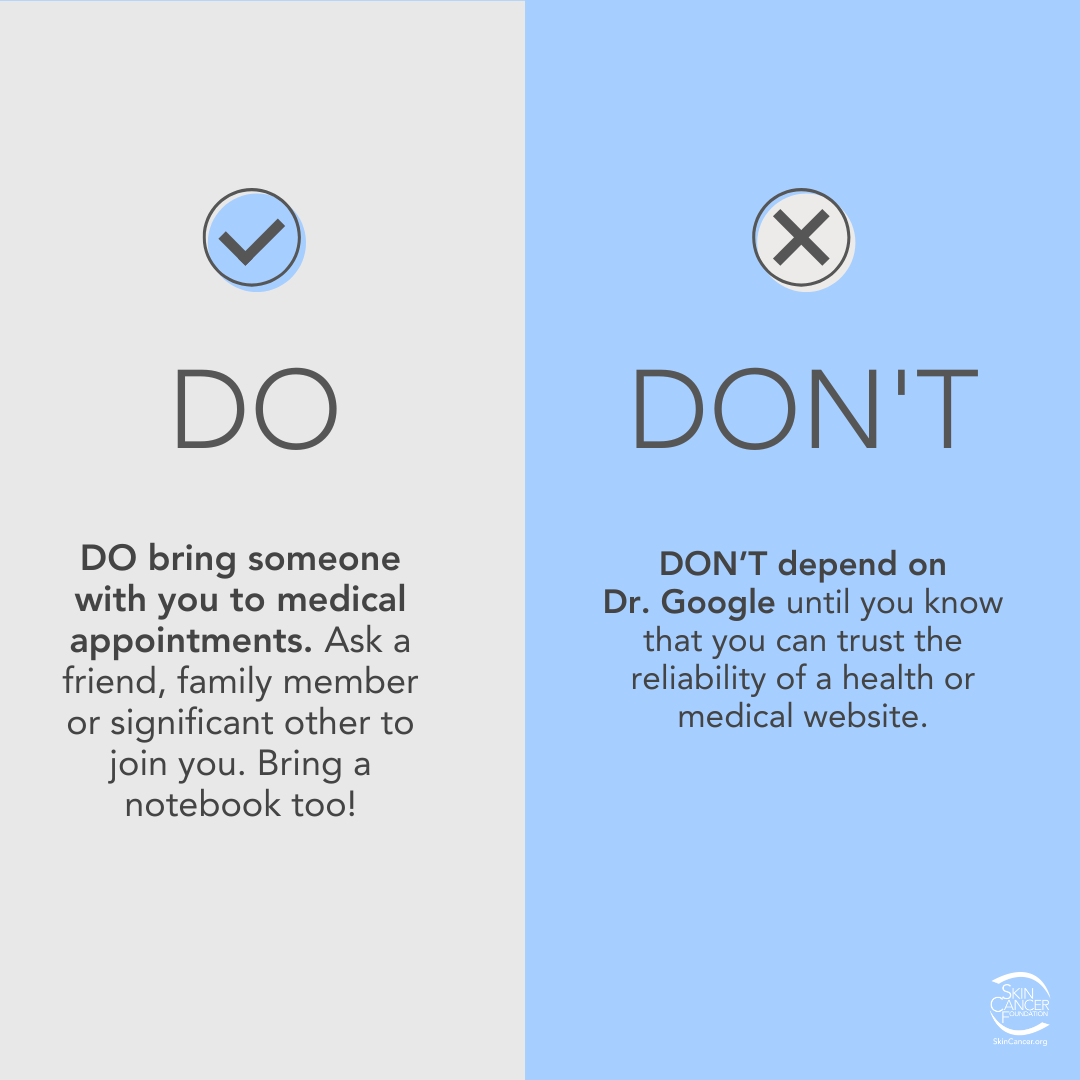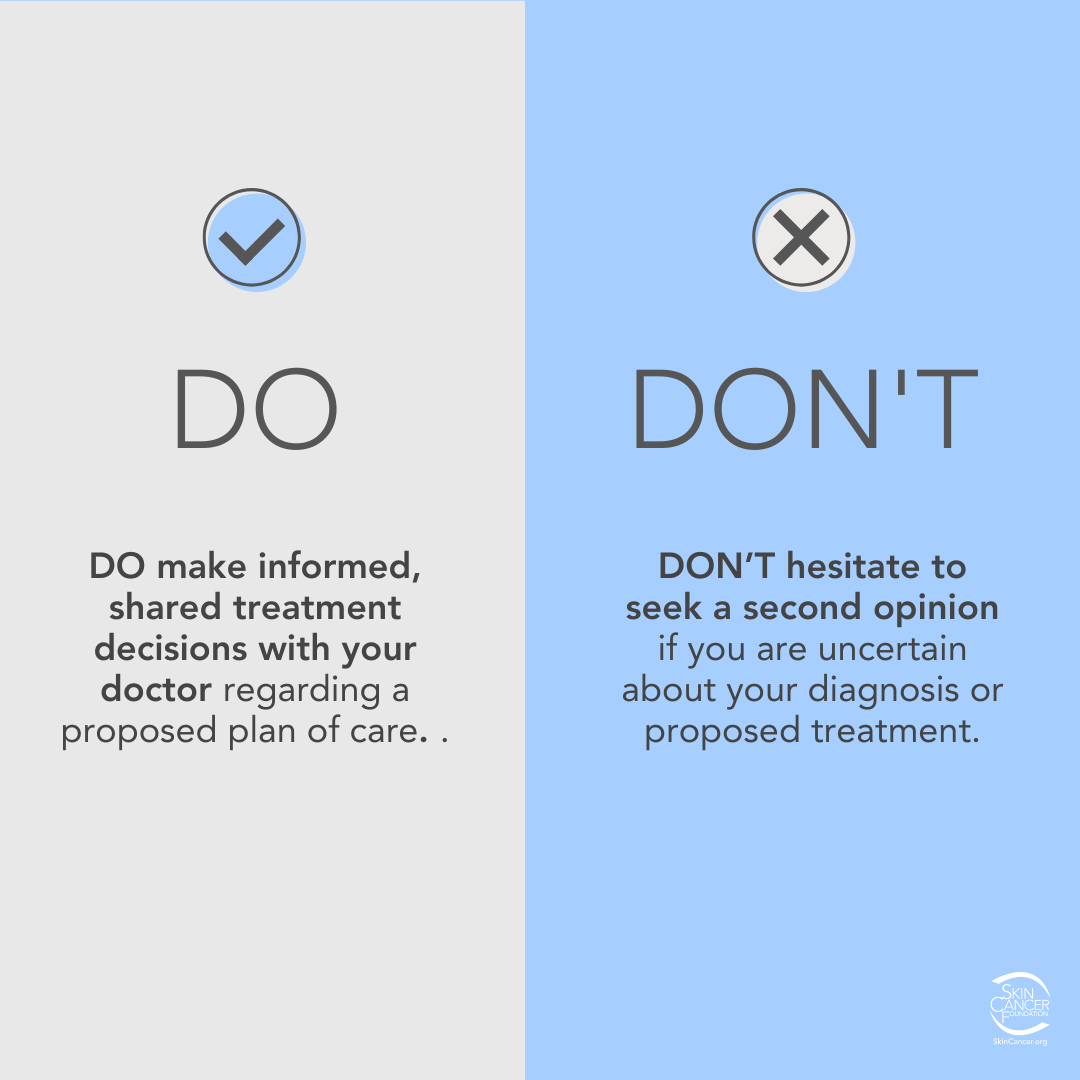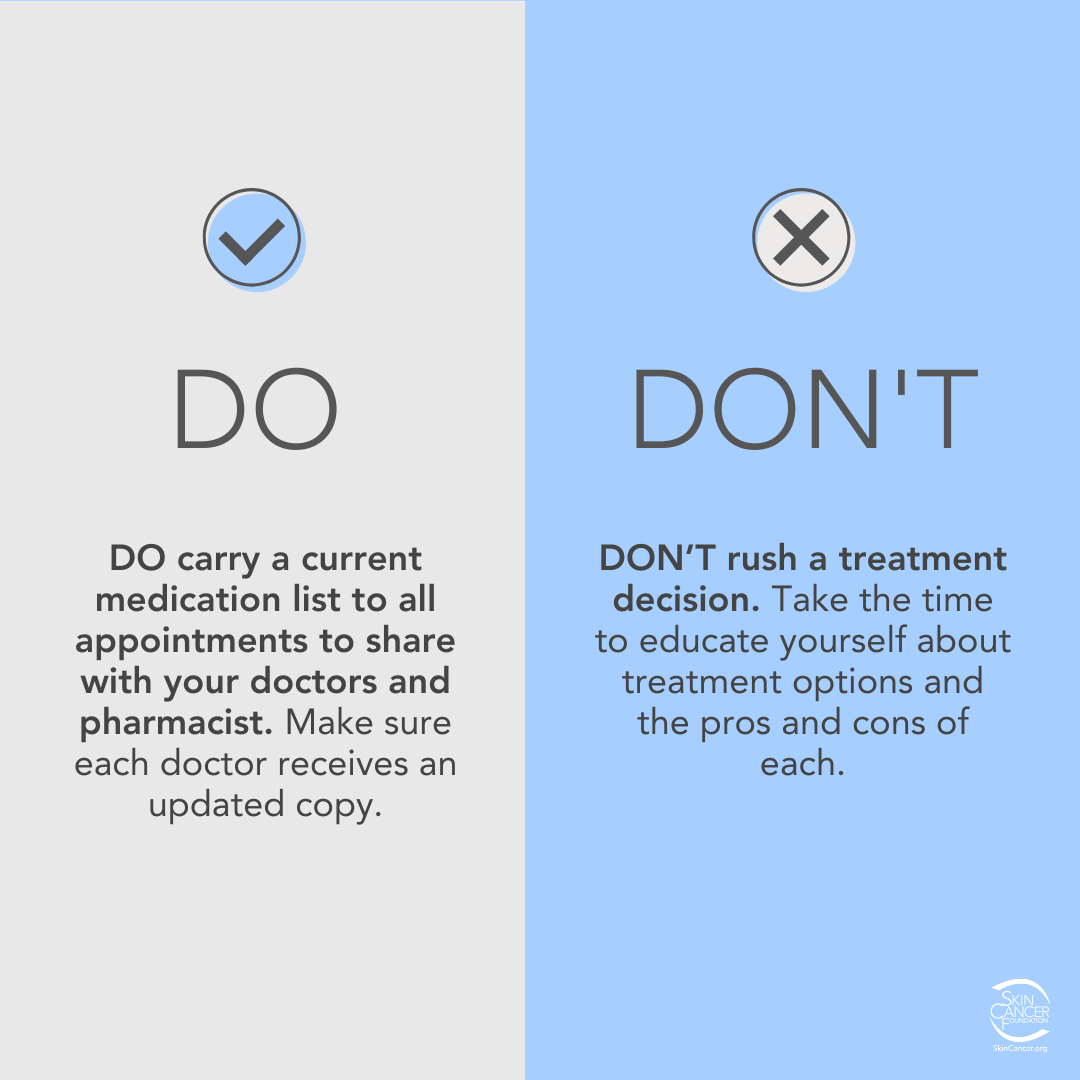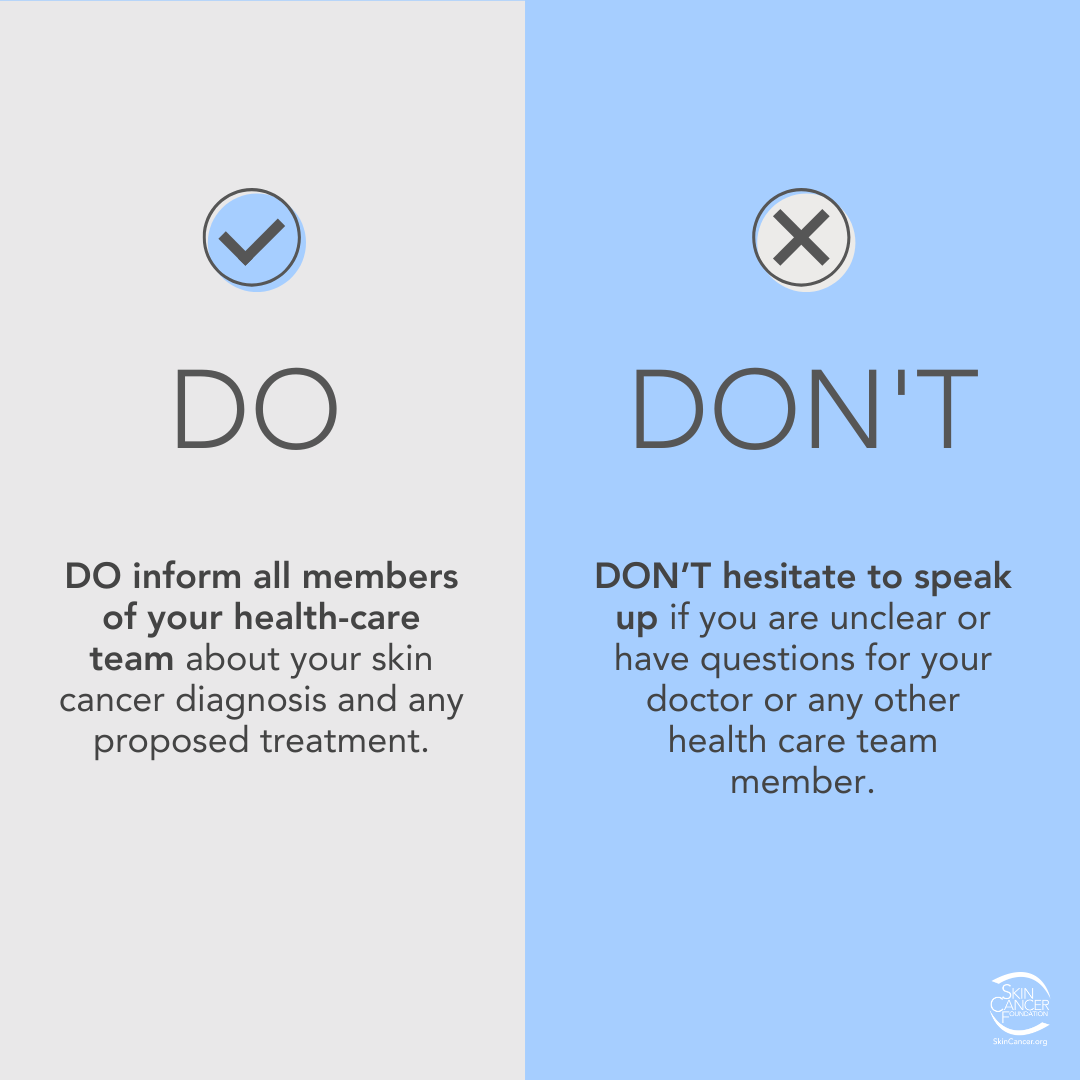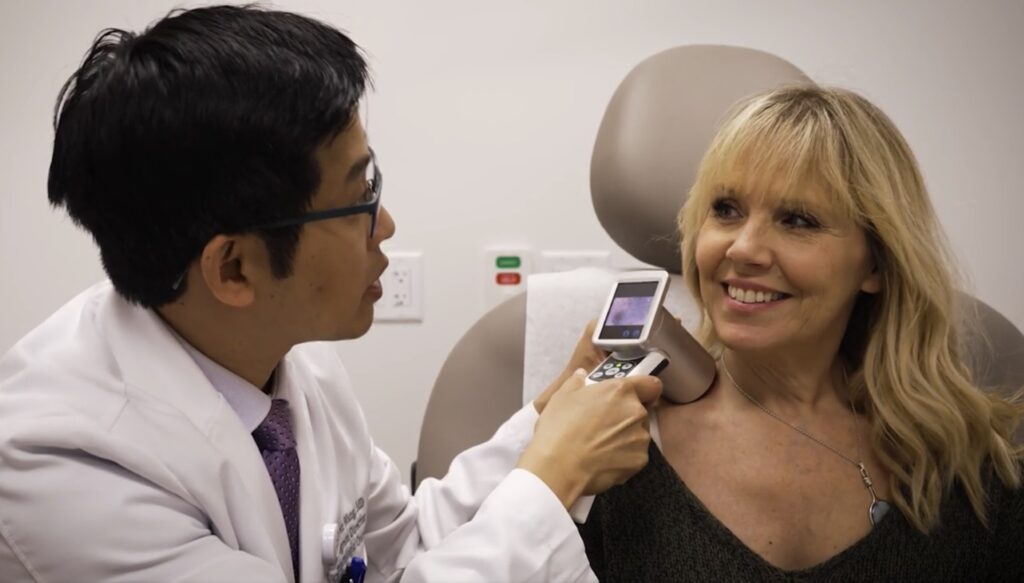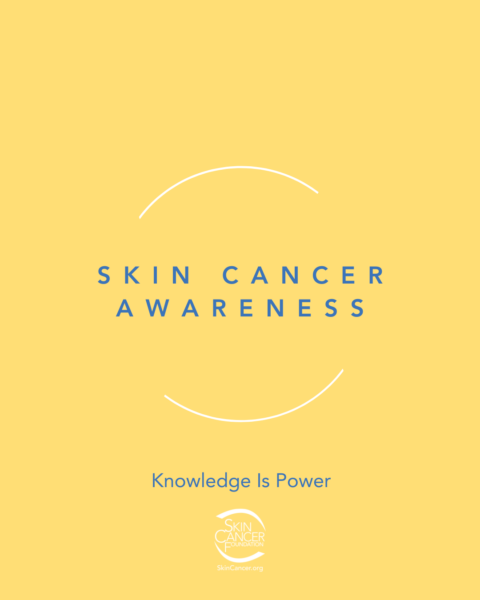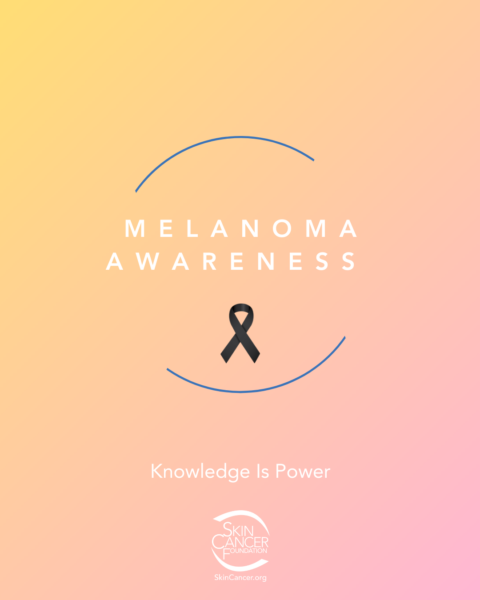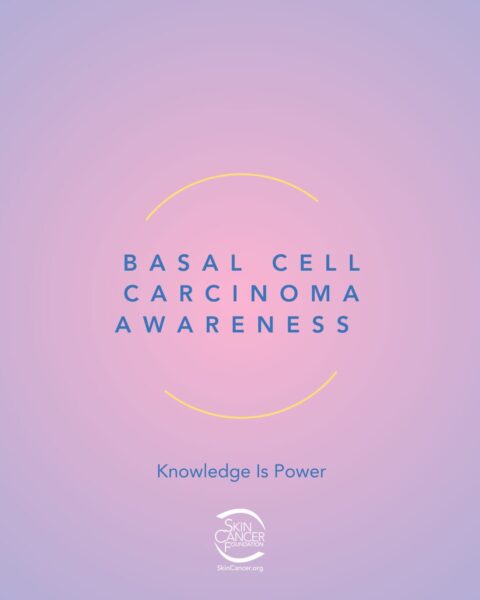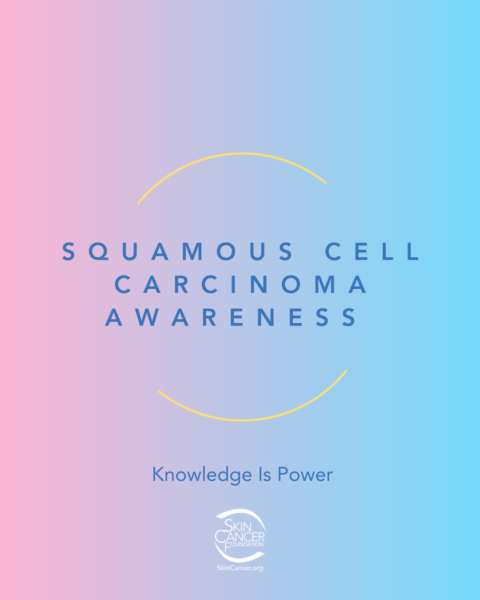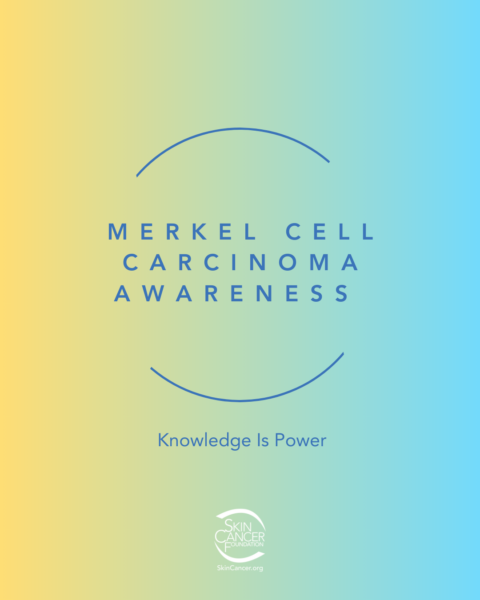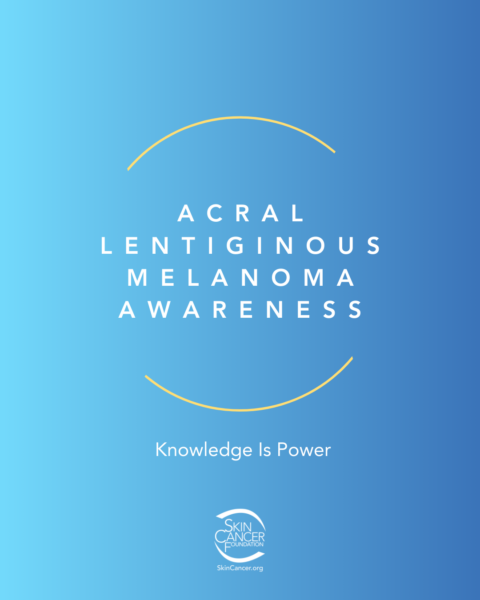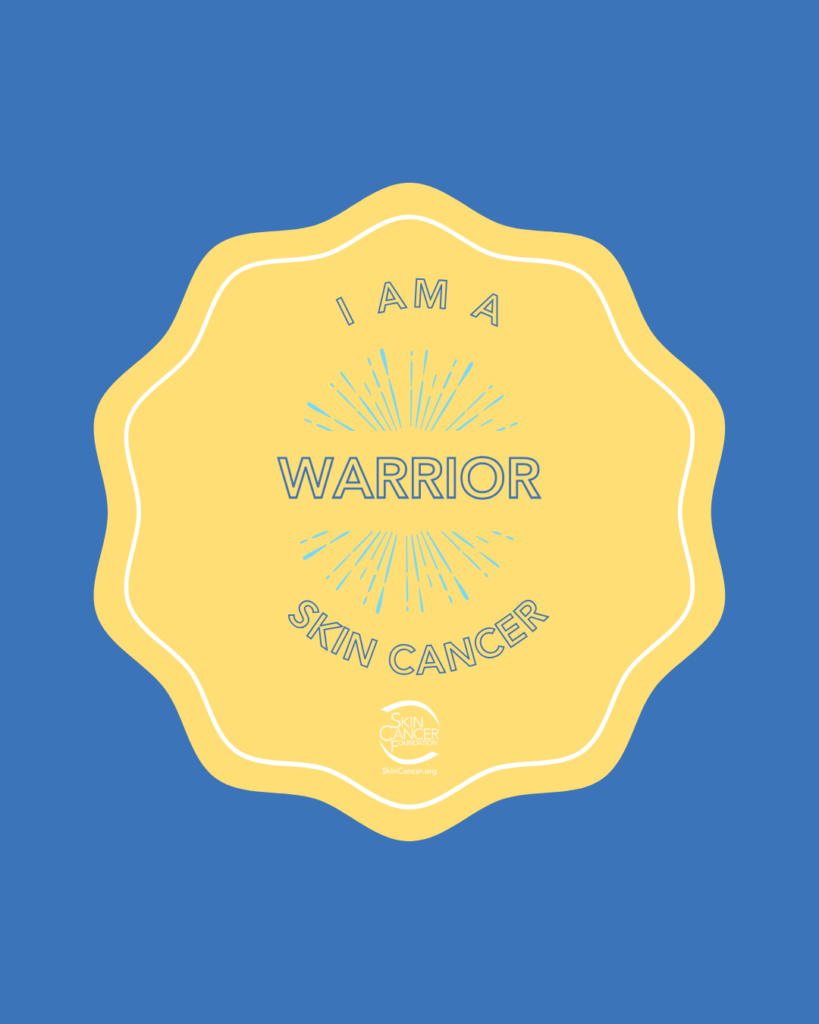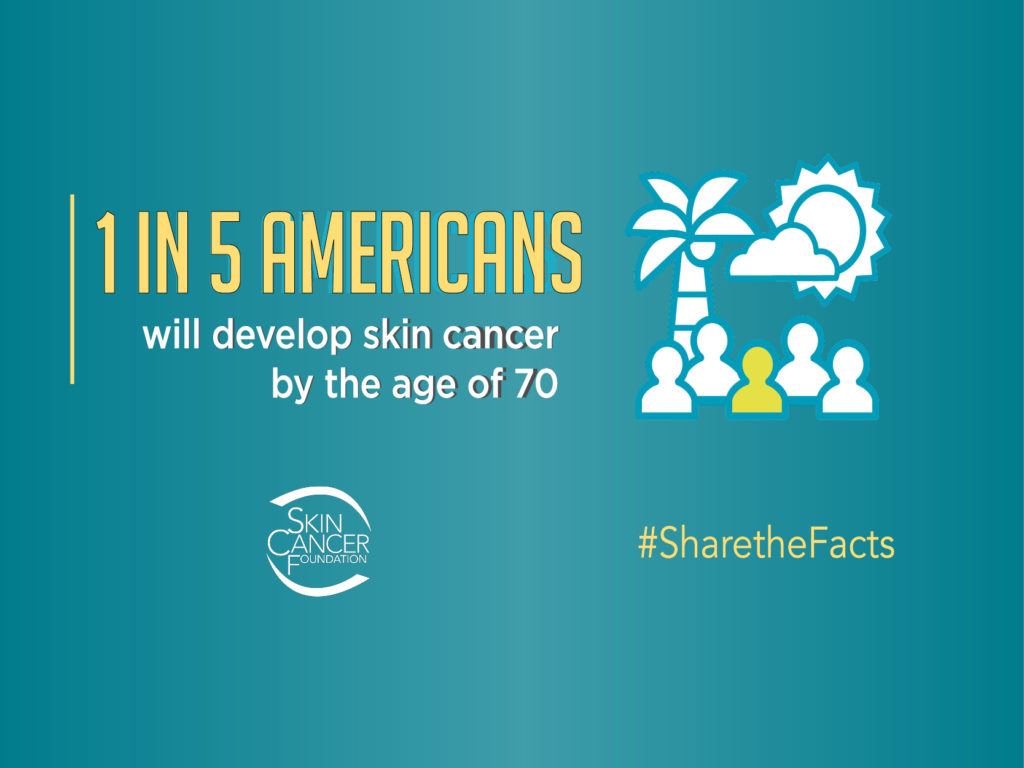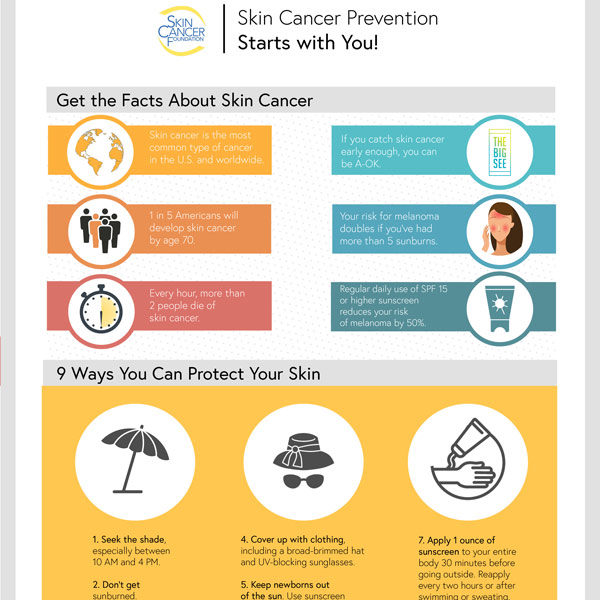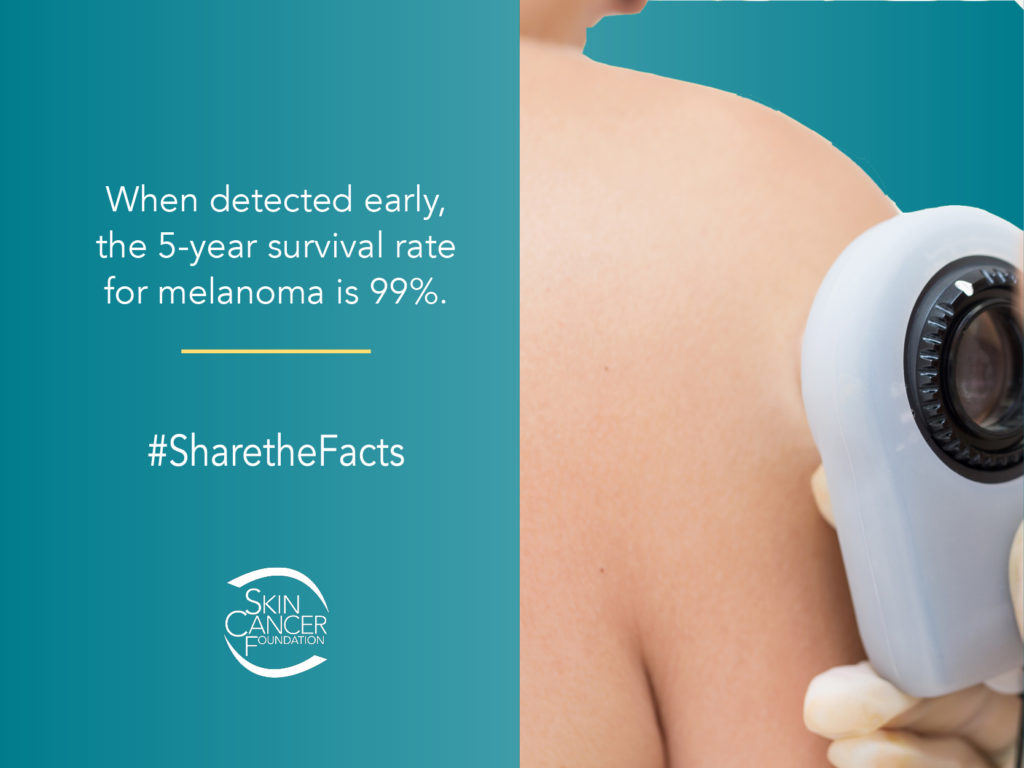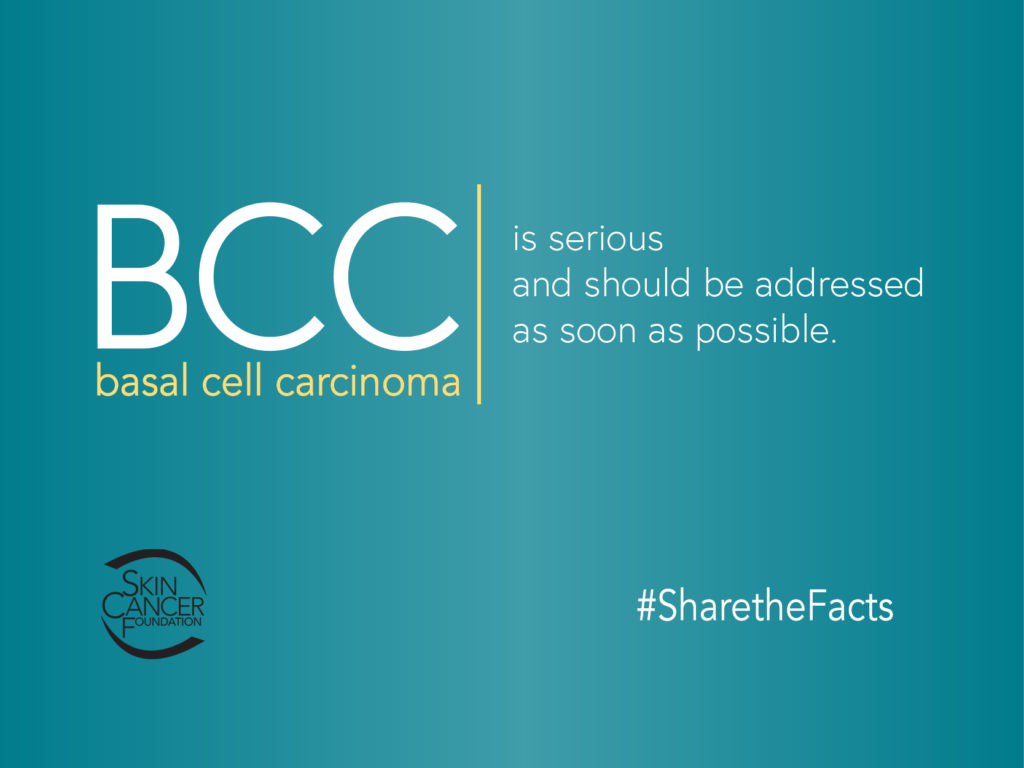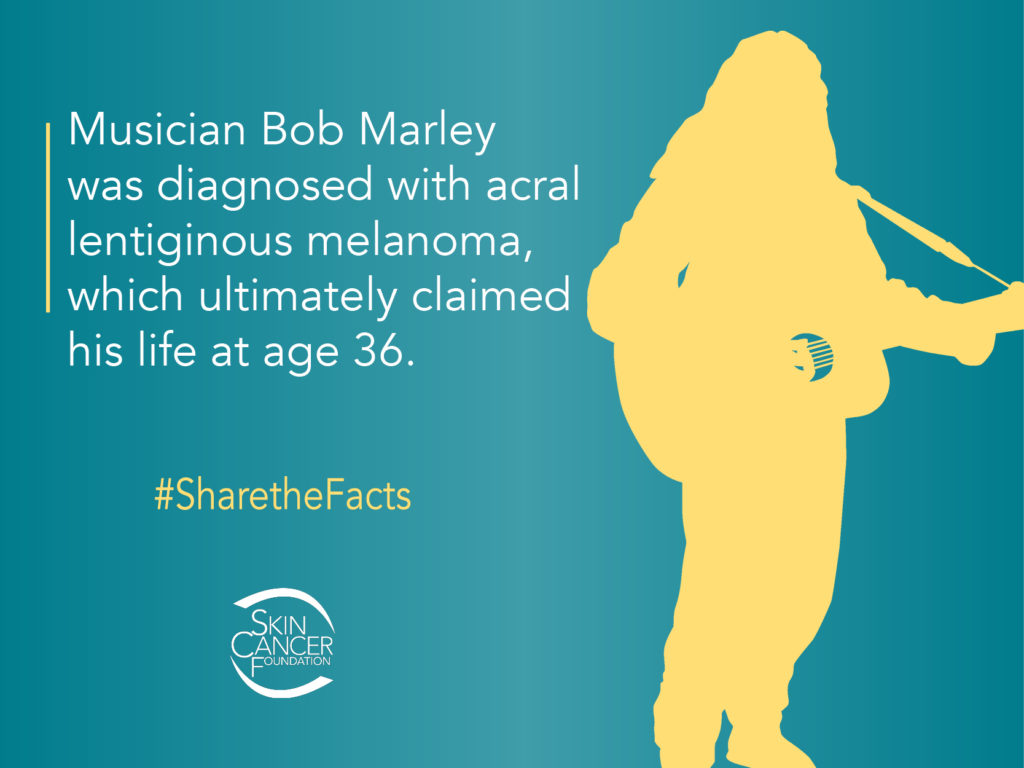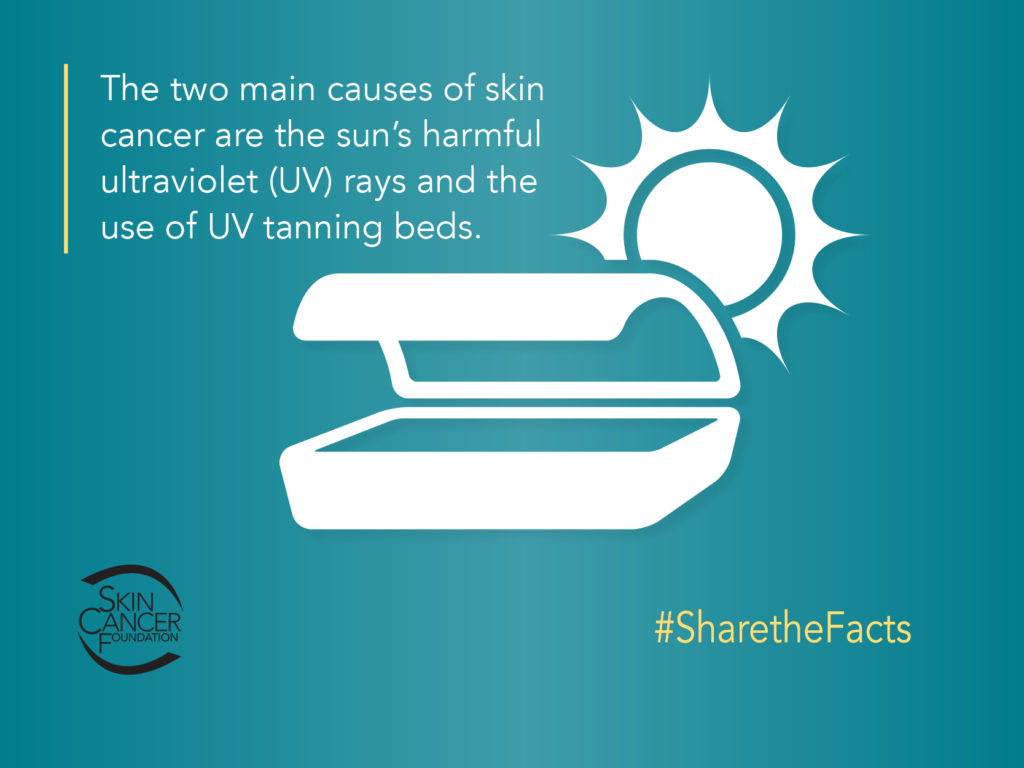Newly Diagnosed with Skin Cancer
Skin Cancer Information, Guidance & Support for You
You Have Skin Cancer
It can be difficult to learn that you have skin cancer. You may feel frustrated, confused and/or angry. You could be facing decisions that feel overwhelming. You might be wondering what to do next.
The good news is that you are not alone. Skin cancer is the world’s most common cancer; millions of people have battled it. And so can you. Your diagnosis is simply the first step.
You may find peace of mind by focusing on the beneficial things you can do to be in the best position to fight skin cancer. We’re here to help you every step of the way.
Knowledge Is Power
Being well-informed about your skin cancer and the options you have to fight it can be empowering. We encourage you to be proactive by educating yourself, advocating for yourself and protecting your skin from ultraviolet (UV) radiation to prevent future skin cancers. Above all, remember that a healthy lifestyle and good health care go hand in hand.
What You Can Do Now
- Contact health care providers, including your primary care physician, specialists, your dentist and pharmacist to inform them of your diagnosis and treatments. This helps providers make informed decisions for your ongoing care.
- Ask questions. When speaking to your doctors, take notes and make sure that you fully understand your treatment options. Ask about surgery, whether you will need a plastic surgeon, treatment side effects and what to expect during recovery. Check our Do’s and Don’ts for Skin Cancer Patients for more helpful tips.
- Find the support you need to cope. We hope you will discuss nutrition, exercise, relaxation or stress-relieving activities, sleep needs and more with your health care team. Reach out to skin cancer communities online for peer support. Check our support resources page for a list of organizations that may be able to help.
- Take a deep breath. You’re stronger than you think, and you will get through this. See below for advice from people who have battled skin cancer and want to support you.
- Skin Cancer Types
- Skin Cancer FAQs
- Do’s & Don’ts for Skin Cancer Patients
- Skin Cancer Pictures
- Skin Cancer Treatment Glossary
- Mohs Surgery for the Newly Diagnosed
- Skin Cancer Warrior Stories
- Skin Cancer Awareness Toolkit
- Skin Cancer Support Resources
- Advanced Skin Cancers
- Skin Cancer in People of Color
- 9 Tips for Taking Your Medication Safely
Know your skin cancer type
Understanding the type of skin cancer you have will determine what your treatment and recovery will look like. Get more information on the types of skin cancers here:

Download Our Skin Cancer Information PDF
Skin Cancer FAQs
Why did I get skin cancer?
The two main causes of skin cancer are the sun’s harmful ultraviolet (UV) rays and using UV tanning beds. The good news is that these risk factors can be controlled by you, by protecting your skin. In addition to UV exposure, risk factors associated with skin cancer including skin type (people with light skin and eyes have a higher skin cancer risk) genetics (about one in every 10 patients diagnosed with melanoma has a family member with a history of the disease) having atypical moles and having a weakened immune system due to medications or medical condition.
What are my treatment options?
The terminology around skin cancer treatment can be confusing. Our skin cancer treatment pages provide physician-reviewed information about each option, written in a way that is easy to understand. Options vary and are specific to the type of skin cancer you have, and your overall health, among other things. So be sure to review the treatment page that matches your diagnosis:
Basal Cell Carcinoma Treatment
Merkel Cell Carcinoma Treatment
Squamous Cell Carcinoma Treatment
Advanced Squamous Cell Carcinoma Treatment
Rare Skin Cancer Information & Treatment
Skin Cancer Treatment Glossary
Mohs Surgery for the Newly Diagnosed
Above all, advocate for yourself! Be sure to speak with your medical team in detail about your treatment options, and ask for clarification on anything you are uncertain about.
Is skin cancer surgery painful?
Be sure to discuss pain with your surgeon before the procedure; ask questions and take notes. Your type or stage of skin cancer can affect your pain level during reconstruction. Depending on the size and location of the wound, the repair may be done using flap surgery. In the case of a more aggressive skin cancer where a wider or deeper removal may be required, there can be more pain associated with the reconstruction done to close the wound.
Pain tolerance is sometimes influenced by factors including the patient’s age, gender and genetics. For example, a young child may have a lower pain threshold compared to an adult. Women may report more sensitivity to pain than men. Stress and patient expectations can also play a role. Patients experiencing a high level of stress prior to surgery and those anticipating severe pain may report more pain. Overall, how a patient experiences pain varies; it’s hard for physicians to generalize how you’ll feel.
Will I have a scar?
If your skin cancer is treated early on, when it’s small, you may not have a noticeable scar. If you need surgery to remove it, you probably will end up with some kind of scar. It’s important to know that the wound that will be created during surgery will often be larger than you may expect. There may be extensions, or “roots,” of the cancer that are not visible from the surface that will be discovered during surgery, requiring the removal of more tissue.
No matter what, your scar is a badge of courage and demonstrates the healing power of your own skin. Learn more about scars here.
Do I have to get my skin cancer treated quickly?
The short answer is yes. Our experts agree that when you’ve been diagnosed with a skin cancer, time is of the essence, meaning you should get treated as early as possible. Skin cancer is serious and treatment should not be delayed.
Melanoma: Melanoma can be invasive and deadly when treatment is delayed. A study in JAMA Dermatology found that melanoma patients treated within 30 days of the biopsy had a better outcome than those who waited.
Nonmelanoma skin cancers: If you are diagnosed with basal cell carcinoma (BCC) or squamous cell carcinoma (SCC)and need surgery to remove it, it’s always better to do it when it’s small. While BCCs often grow slowly, they may bleed, get scabby and unsightly, and invade deep into local tissue. Left untreated, they can eat through muscle, even bone, and that can make surgery more difficult and disfiguring. SCCs can attach themselves to local lymph nodes and spread to some organs, and can become deadly. The latest figures suggest that each year, about twice as many people die from SCC than from melanoma.
Will my children get skin cancer?
While skin cancer is the world’s most common cancer, it is uncommon in children, with only about 300 new cases per year in the U.S. But skin cancer can occur in children and adolescents.
In fact, melanoma, a dangerous form of skin cancer, is the second most common cancer in people aged 15 to 29. Risk factors for childhood melanoma include genetic predisposition and family history.
Additional risk factors include light skin and a high level of ultraviolet (UV) radiation exposure — specifically, intense sun exposure early in life.
Knowing what to look for, and detecting skin cancer early is crucial. Monthly skin self-exams help children and their parents get keep an eye out for anything new, changing or unusual. If your child has a spot that just doesn’t seem right, have it checked by a physician. The earlier a skin cancer is detected, the easier it is to treat and cure
Will my skin cancer come back?
There are many factors that contribute to whether or not your skin cancer will return, including what kind of skin cancer you have, how early it was detected and treated, and the method used to treat that cancer. Get more information from our expert.
About 60 percent of people who have had one skin cancer will be diagnosed with a second one within 10 years, says a 2015 study in JAMA Dermatology. If you’ve had one type of skin cancer, statistics show you are also at risk for the other types, including melanoma, which can be life-threatening. Get information about having skin cancer more than once.
Learn about how AI can help predict the likelihood of skin cancer recurrence.
Understanding Skin Cancer
What is skin cancer? What does it look like, what causes it and how is it treated? Get the answers to these questions and more in this educational overview of the world’s most common cancer.
Skin Cancer Warriors Share their Stories
Katie’s message to all skin cancer warriors: “Do things for yourself. Set healthy boundaries. Practice sun safety. You have so many people on social media to support you. You’ve got this!”
“Find the best help that you can.” Luis was diagnosed with Merkel cell carcinoma, a rare, aggressive skin cancer. He and his physician offer advice for people newly diagnosed with MCC.
Advanced Skin Cancers
Thanks to increased public awareness and advances in early detection, skin cancers today are often diagnosed and treated in the early stage. Still, any type of skin cancer, whether common or rare, can grow, spread and become dangerous or even life-threatening.
If you are diagnosed with any form of skin cancer that becomes advanced, whether it’s a BCC, SCC, melanoma or Merkel cell carcinoma, you should always ask your dermatologist if you need to see a medical oncologist. Advanced skin cancers often require a multidisciplinary health care team.
Check the links below for more information and resources for patients with advanced skin cancers.
- 10 Things Everyone Should Know About Advanced Skin Cancers
- Building Your Skin Cancer Team
- When a Common Skin Cancer Advances
- Coping with Advanced Melanoma During Pregnancy
- Trial and Error: A Dermatologist Diagnosed with Advanced Skin Cancer
- Advanced Squamous Cell Carcinoma Treatment
- Advanced Melanoma Treatment
- Clinical Trials Finder
Note: The Skin Cancer Foundation provides a link to external search tools to help you locate health care programs. These links are provided as a resource and do not signify our endorsement of the programs listed therein.
Skin Cancer Support Resources
A skin cancer diagnosis can be physically, emotionally and financially challenging. You’re not alone. Our Robins Nest program provides you with a carefully curated list of organizations that offer assistance with insurance, health care costs, transportation, coping support and other issues that arise with a skin cancer diagnosis.

